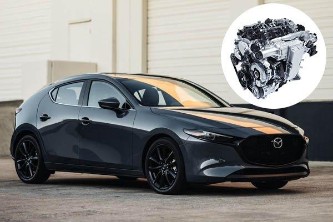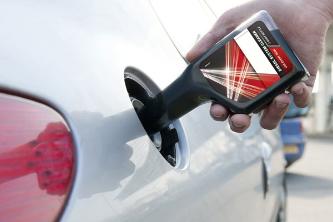gasoline forklift
Artikel Terkait gasoline forklift

Kia debuts Kia Stinger facelift; New ADAS, 304 PS, 422 Nm
The performance sedan will still be powered by an updated Lambda 3.3-litre T-GDi (turbocharged gasoline
Want your car to last a million miles? Take advice from a man who did 3.2 million
Here are his few tips from an interview with Casey Williams: Use gasoline from a high-volume station
2020 Kia Rio upgraded in Europe; Mild hybrid powertrain, new ADAS, UVO Phase II
The 1.0-litre T-GDi (Turbocharged Gasoline Direct Injection) engine now produces 100 PS, while the naturally
New Peugeot 3008 facelift debuts with 520 Nm, double the torque of Honda City RS
Active Pack”, and “GT Pack”.Powertrain HighlightsThe updated 3008 is available with a gasoline
Elon Musk calls hydrogen cars “mind-boggingly stupid”, but BMW still believes in them
The 6.0 L V12 could run on either petroleum gasoline, or pure hydrogen gas.
More Mitsubishi hybrids planned for ASEAN, Xpander Hybrid by 2023
line-ups.Malaysian-spec Mitsubishi Xpander.Aside from the plug-in Outlander, Mitsubishi will launch a conventional gasoline-electric
Are these the best 4 Malaysian police cars ever?
Motors Group in the 70s, and later Milan Auto in the 90s.The Alfetta was powered by a 130 PS 2.0 L gasoline
Daimler confirms engine partnership with Geely, to include Proton and Volvo Cars
Both groups will use global R&D networks to work together on a next-generation gasoline engine specified
Is that an Audi? Kia K8 records highest pre-order numbers ever
GDI (300 PS/359 Nm) 3.5 L Smartstream LPI (240 PS/314 Nm) 2.5 L GDI (198 PS/248 Nm) 2.5 L MPI*GDI= Gasoline
Why scheduled oil changes are important for your car
Research on gasoline engines also show a similar pattern of reduced viscosity with increased operation
Volkswagen T-Cross Coupe Will Be Unveiled!
rear passengers.As for the power, the new-gen T-cross Coupe will continue the use of 1.0 and 1.5 TSI gasoline
All-new 2020 Kia Sorento - 35 mm longer wheelbase, new 8-DCT, 227 hp/350 Nm hybrid, PHEV next
This comprise of a 1.6-litre T-GDi (turbocharged gasoline direct injection) engine paired to a 59 horsepower
Volvo XC90 T5 Formally Enters Malaysian Market - Only Sale For RM 373,888!
abandons the previous version T8s hybrid combination and adopts the power configuration of the pure gasoline
Watch out Civic, Hyundai Malaysia teases 2021 Hyundai Elantra
coming to our shores soon.Worldwide, the Elantra/Avante is available with several drivetrain options (gasoline
All-new fourth-generation Kia Carnival global debut; Bigger and safer than ever
issue voice commands to the infotainment system.Powertrains include a newly designed 3.5-litre GDi (gasoline
Mobil has a new engine oil that will protect your turbocharged engines
as follows: 0W-20 is most suitable for Toyota, Honda, Nissan, Hybrid and other newer ECO Japanese gasoline
35 years of Proton – Could Proton have achieved more at 35?
At 24 years old (1991) Hyundai built their first engine called the Alpha, a 4-cylinder gasoline engine.Global
0-100 km/h in 6 seconds, the new Toyota RAV4 PHEV is the ultimate sleeper
does it in 5.9 seconds), the RAV4 is also equipped with Toyota’s E-Four electric 4WD system.The gasoline
VW owners in China facing clogged particulate filter problem because they don’t drive fast enough
Volkswagen owners in China are reporting clogged gasoline particulate filter (GPF) which results in high
Toyota wants to use hydrogen save the internal combustion engine, when everyone else is giving up
himself added, "Please understand that carbon neutrality cannot be achieved by simply banning gasoline
Review Post gasoline forklift
3.5 ton LPG gasoline forklift with Japan Nissan K25 engine for Mexico client Skye:wenqian.guo Wechat:008618769791709 https://t.co/P5sDWLwkX0
Congratulations! Our 3ton gasoline forklift is delivered today,3t capacity with NISSON engine, do you need diesel or electric forklift, please contact Alex goodsense@hnxdcc.com, or leave me your message here, i will contact with you https://t.co/VJW2W809Ek
UN LPG & Gasoline Forklift from 4Ton to Mini 5Ton Contact emma@unforklift.com #unforklift #LPG #gasoline #ICforklift #heavyduty https://t.co/gEEA7Cft4W
LPG / Gasoline Forklift 6 Ton and 3.5 Ton https://t.co/q8XTb8Rk8h
@oatmelks 2017 LP CAT Gasoline 2C500 Forklift https://t.co/raPqjgXZLs
1.0 ton - 4.5 ton LPG/Gasoline forklift http://t.co/7fgnIamDry
New 2.5ton LPG&Gasoline forklift is ready to Mexico https://t.co/iyBf4dpOEf
TCM Gasoline Forklift - 3.5 – 5.0 Ton http://t.co/NumPqdzotx http://t.co/pazsNEBFQn
New 9 unit diesel and LPG&Gasoline forklift are ready to ship to our Croatia client.Thanks very much for our client' trust. https://t.co/bNHBGx3S5c
TCM Gasoline Forklift – Cushion Tire Series http://t.co/BDPwlw2TLq http://t.co/YhVC7Q8zEh
Review Q&A gasoline forklift
Why does the forklift I use run on propane and not gasoline?
Operating a gasoline fueled engine INSIDE a building has a major problem- it produces carbon monoxide- which can make you sick or kill you. Burning propane makes carbon dioxide and water vapor- much safer for people.
Why does the forklift I use run on propane and not gasoline?
That's because propane-powered forklifts have much lower carbon emissions as compared to gasoline-powered forklifts. Moreover, propane-powered engines also last much longer. Besides ,check the price on used forklifts first,, you might also want to consider the fuel type as it makes a lot of difference. Propane-fuelled forklifts are the darling of most companies for indoor use because they provide better operational value, among other reasons. Hence, it's not surprising that you operate one at your place of employment. There are some practical advantages of purchasing propane-fueled forklifts as opposed to gasoline or electric models. They include: They are less expensive They produce fewer emissions Reduced Expenditure Often than not, less expensive products offer less value; however, it's a different ball game with propane-powered forklifts. In comparison to electric forklifts, propane-powered models are less costly to acquire and maintain. Companies just need to buy cages for storage, which can last for about 10 years, and cylinders for propane storage, which can last for nearly 27 years to keep the forklift operational. In contrast, the cost of charging electric forklifts is quite high, not forgetting the inevitable reduced battery output, which will warrant extra maintenance cost. Also, the cost of diesel equipment is not pocket-friendly at all, and you'll be better served with propane forklifts. Lesser Emission Output In contrast to gasoline, propane produces less CO2 emissions, so it's a better fit for indoor use. You don't want to be breathing and working in a CO2-stuffed warehouse all day. Also, it produces about 70% less site-to-source emissions in contrast to electric-powered forklifts. Footnotes:
Why do forklifts use propane as fuel as opposed to another fuel?
Propane has several very useful properties that make it ideal for most forklifts. First of all, it’s clean. Propane is a liquid that evaporates into a gas when used as fuel. If you have a fuel leak in your warehouse you’re not going to have a cleanup problem like gasoline or diesel. Second of all, it burns clean. As long as you’ve got enough oxygen, burning propane results in carbon dioxide and water. When operating in an enclosed space like a warehouse, this is extremely important. When using a dirty fuel like gasoline or diesel you’ve got lots of naughties being generated like carbon monoxide, nitrogen oxides, and soot. You don’t want to be breathing the air. As a byproduct a clean fuel like propane keeps the engine and forklift itself clean. Propane engines are simpler because you don’t have to vaporize the fuel before combustion. Propane automatically vaporizes itself pretty vigorously as you use it. The engines don’t need carburetors or fancy fuel injectors as with naturally liquid fuels. Propane is readily available and contains a better energy density than lighter hydrocarbons like methane so a tank of fuel lasts longer. Propane boils at -42 degrees Celsius. It normally needs no pressurization for this reason. Even when operating in really cold weather the fuel tank can be pressurized with nitrogen. Butane has a boiling point of around 0 Celsius so it’s not as useful in colder situations. This is the reason why a pocket lighter that runs on butane won’t light if it’s sitting out in cold weather. You need to put in in a pocket or inside your coat to warm it up enough for it to work. Propane freezes at -187 degrees Celsius so the fuel becoming thick and sluggish is never a problem like it could be for diesel or gasoline engines. Other fuels may have an advantage in one or two ways or for specific uses, but as an all-around-package propane is generally the way to go. Edit: One more addition thanks to a comment by ,Kai Herrmann, that I didn’t think of. Propane is much more shelf stable than heavier fuels like gasoline and diesel. If you don’t use it much, this could become an issue. Heavy fuels have an annoying tendency to separate and gum up over time.
Is BBQ propane and forklift propane the same?
The propane itself is the same, but you CAN NOT switch the tanks. They have different connections to prevent you from doing so, but you wouldn’t want to anyway BBQ grills need vapor propane and BBQ tanks take vapor off the top of the tank. Forklifts need liquid propane and forklift tanks have a dip tube inside so they are fed liquid propane. It is worth mentioning that ,second hand forklifts can be a better deal,. As far as I know, yes. Propane is a specific type of hydrocarbon gas (chemical formula C3H8) - The difference between what you use in your forklift and your grill will be the container and what you can hook it up to. Propane tanks that you use for your grill are generally 20 lbs, so easy to carry and get refilled. A forklift with that small of a tank would need to be refilled almost daily so they typically will have 50 lb or larger tanks on them and where they are used will likely have its own filling station. They're typically used for outdoor work while warehouses tend to use electric forklifts. The fitting on the tanks may be different but the gas inside? Not so much .. Propane has several very useful properties that make it ideal for most forklifts. First of all, it's clean. Propane is a liquid that evaporates into a gas when used as fuel. If you have a fuel leak in your warehouse you’re not going to have a cleanup problem like gasoline or diesel. Second of all, it burns clean. As long as you’ve got enough oxygen, burning propane results in carbon dioxide and water. When operating in an enclosed space like a warehouse, this is extremely important. When using a dirty fuel like gasoline or diesel you’ve got lots of naughties being generated like carbon monoxide, nitrogen oxides, and soot. You don’t want to be breathing the air. As a byproduct a clean fuel like propane keeps the engine and forklift itself clean. Propane engines are simpler because you don’t have to vaporize the fuel before combustion. Propane automatically vaporizes itself pretty vigorously as you use it. The engines don’t need carburetors or fancy fuel injectors as with naturally liquid fuels.
Which is more economical, buying a used forklift or to hire a forklift?
If you're going to use a forklift for a few days only, then it's better to hire it. However, you can spend more money on hiring one in the long run because you will have to do it every time you need a forklift. If you're using a forklift frequently, it makes more sense to buy a used one. The ,used forklift prices, are quite affordable. You can check them out on the used forklifts websites. It's a better option in the long run because you will always have a forklift at your disposal whenever you need one. You can find good used forklifts models that will be suitable for all the work that needs to be done. If you get one in good condition, it can last you a long time with proper maintenance. Knowing how to take care of your forklift is the best way to prolong its service life. By analogy with cars, the built-in engines in forklifts can be divided into 4 conventional types: Gasoline; Diesel; Gas; Electric; The forklift's service life is determined not by kilometers but by the hours of operation of the engine - the time of continuous operation of the machine. After the specified time, the forklift is sent for scheduled repair and maintenance. Forklifts differ in power, and gasoline ones are usually the most powerful, capable of lifting heavy loads. Many manufacturers produce various accessories that are mounted on branches or forks, using special quick-release clips. With their help, you can significantly expand the capabilities of your forklift. The best forklift Brands: Hyster: ,Their forklifts are known to be durable and long-lasting. Yale: ,They specialize in forklifts and offer a vast selection of models. CAT:, It's the best know name for heavy machinery ,equipment,. Their forklifts are of the best quality, and they're worth the higher price. Crown:, They're the best option when it comes to electric forklifts. Their equipment is well-made and durable. Kalmar:, They're the best option for a specialized forklift. Anyone that requires specialized forklifts should look through the models they offer.
Why did Dodge make the 5.9 gasoline engine and a 5.9 diesel engine during the same generation? How many parts were interchangeable between the two engines, if any? Which engine would you prefer in your truck if you had to choose?
Well, let’s first make it clear that Dodge did not make the 5.9 diesel engine. That engine was and is made by the engine manufacturer, Cummins. This engine is used worldwide in everything from generators, to boats, to yard trucks, to forklifts, to garbage trucks and plenty of other machines. It is an inline 6 cylinder turbo diesel. It was rated at many different outputs depending on application and is world renowned for its durability and reliability. The 5.9 V8 gas engine was indeed made by Dodge. It was part of the LA engine family which included the 273, the 318, the 340, the 360 (5.9) and the 488 V10 and was made from 1971 to 2002. It was reliable and moderately powerful but very thirsty. Absolutely nothing can be interchanged between the gas and the diesel 5.9 engines. Both engines were offered because some people wanted the efficiency and low end power of the diesel as well as the pulling power. Some people didn’t need to tow heavy trailers and didn’t want to pay the premium for the Cummins so they got the 360 and some even chose the smaller 318 version (5.2L). As far as I’m concerned, the Cummins diesel is the only choice since it offers better power and better mileage than any gas option, whether we’re talking about the 1990s or today. Nothing beats the sound and smell of a diesel, and I pull trailers very often. Also, the diesel allows for easy power upgrades which is an extra benefit. I’ve had a Cummins powered Dodge truck with a manual transmission and a lot of upgrades and it was a blast to drive and pulled a trailer like a freight train.
I have seen propane-powered forklifts used indoors. Is this safe?
Sure, if there is proper ventilation. Forklifts are not used in trivial spaces. Warehouses and other large spaces are the norm, and they are properly vented if they are commercial spaces. With the proper ventilation, absolutely. Just like the ones that are gasoline powered. Usually, they are used only in a warehouse situation where there are large open doors that allow for air circulation…. If someone was using a forklift in a smaller space, then he or she would have to provide ventilation according to the manufacturer's specs. ,search in a forklift marketplace ,can be facilitated with used-forklifts company Propane is used because it is cleaner burning than gasoline or diesel, but even if it is as clean as possible, it still produces CO2. As Mr. Della-Monica points out, propane forklifts are used in large-volume buildings with large footprints and high ceilings and (very often) with large doors open to the outside at the loading docks. If you had a smaller space like a Home Depot store, then you use an electric forklift. It’s long been an ideal “EV” back when lead-acid batteries were the only battery choice because they need weight to counterbalance the load and they operate on smooth, flat surfaces. Ideally, CO levels would be monitored in case the propane-fueled forklift’s fuel mixture or emission controls were off. But all the warehouses I’ve used propane forklifts in were large spaces and, at least while the forklift was in use, multiple loading-dock doors were open.
 Beranda
Beranda 


